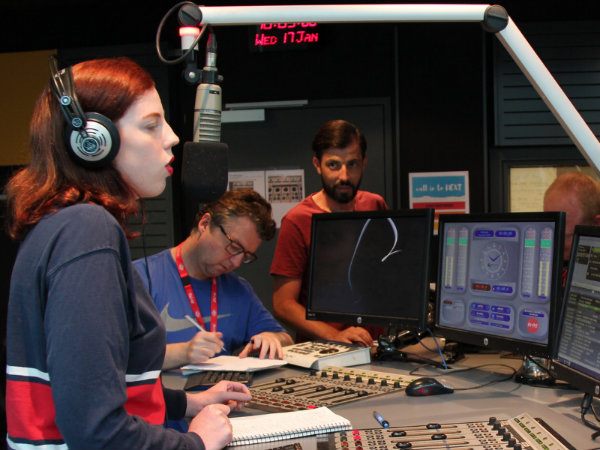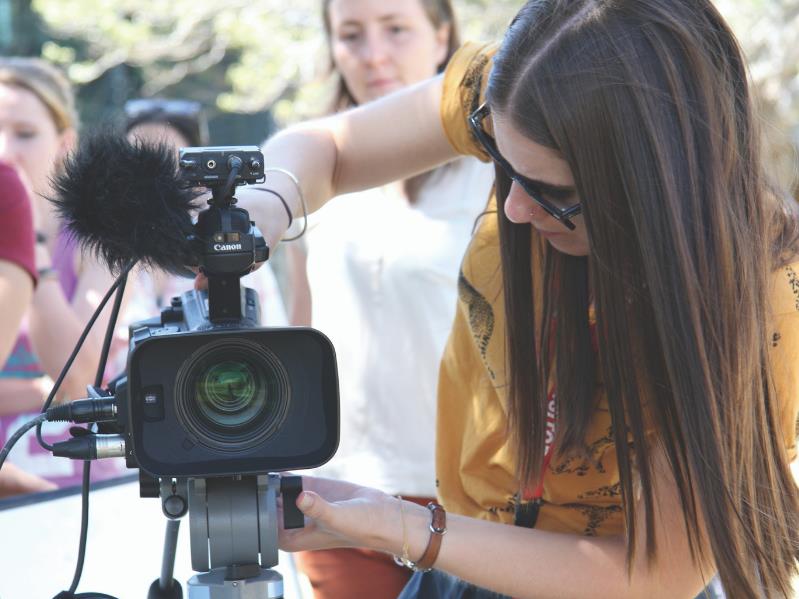Image supplied
If you’re looking to make a start in the world of film, radio, television or online media, or looking for a way to build on the media skills you already have, then a course at the Australian Film Television and Radio School could be just what you need.
‘It’s very competitive, and it’s an industry a lot of people want to work in,’ said Wendy Gray, Head of Industry Program at the AFTRS.
‘What we aim for when people come out of one of our short courses, especially if it’s an Industry Certificate, is we say, “Here are the skills you’re going to learn, here’s how you are going to learn them,” and that’s what we promise – that they are going to achieve by the end of it.’
A changing industry
The nature of the industry itself has also changed dramatically in recent years. ‘The way that we talk about industry now,’ said Gray, ‘is basically that it includes people and organisations that are involved in storytelling through images and sound, regardless of platform. We incorporate obviously radio, television and film – the traditional platforms – but also digital content, including commercial content on the Internet. That includes webisodes, podcasts, branded marketing content, and social media content. We’ve really broadened out our definition of “industry”.’
There are several different kinds of short courses being offered by AFTRS. The Summer Intensive program includes short courses across film, TV, radio and digital, aimed at both newcomers and those already established in the industry and looking to broaden their skill set.
At five days long, each course ‘basically mean taking a week off,’ said Gray, ‘but the reason we schedule them in summer is, they start in November and run until the end of February, which is traditionally the time when people are on holidays or travel to Sydney.’
Courses tend to have a broader general focus, with the aim of giving students a feel for certain areas or roles and skills in the industry. ‘For example,’ said Gray, ‘there’s Filmmaking Intensive, which is a general film-making course – you get a taste of what pre-production, production and post-production is all about; it’s very hands-on and [participants] make a short film together within a week.
‘Then there’s another course in our Summer Intensive program titled Prop Making and Scenic Art. It’s a very hands-on course where they get taught specific skills in set finishing and creating specific props, so it’s a real hands-on art department course.’

Image supplied
Industry Certificates are a new suite of longer courses aimed more at professionals seeking high quality training, or emerging practitioners who are looking to boost their skill level with an eye to furthering their career. These range from three week intensive weekday courses to part-time courses running between eight and 22 weeks.
‘Each course has a slightly different delivery pattern,’ said Gray, ‘but the longer courses are often at night, on weekends and online primarily. There’s a range of options.’
The Industry Certificate courses are designed to equip students with specific skills within the industry. ‘For example,’ said Gray, ‘there’s a TV Assistant Editor course, which is basically the entry level role to work your way towards becoming an editor. There’s a Colour Grading course, which teaches people how to use DaVinci Resolve, which is colour grading software that’s the most widely used in the industry. That attracts people who work in post-production, but also some cinematographers who want to have that as an asset in their skills library.
‘Our writing Industry Certificate, which is called Writing a Web Series, focuses on scriptwriting, but we are focussing on the format of writing a web series as they’re very manageable bite-sized episodes that people can focus on writing within the course. These days making their own web series is almost like the entry level job for aspiring writers, directors, and producers. And they’ll learn screenwriting skills they can apply to other formats,’ she explained
Keeping the courses relevant
‘While we do have Industry Certificates aimed at specific skills and needs in what some like to call “heritage media” – broadcast TV and so on,’ Gray said, ‘we also have our Content Creation and Digital Producer Industry Certificates which are very much targeted towards people who are making digital marketing content, communications content, and social media content.’
Keeping in touch with industry and designing courses that reflect the industry’s needs, is paramount at the AFTRS. ‘Everyone who teaches our courses, the short courses and Industry Certificates, are all … people who are working in the industry. We also have four industry advisory panels who we regularly consult with; they give us input about what things they think we need to run courses in. They tell us what we’re missing out on or what we’re doing well, and they keep us up to date with trends in the industry.’

Image supplied
Gray sees the strong connections between AFTRS and Australia’s film and television industry as one of the school’s biggest assets.
‘I think one of the things that people get out of our courses is that they meet people working in the industry. Obviously a lot of courses also have guest lecturers as well as the main lecturer, so they often get to meet a number of people who are working in the industry and make contacts and network. This of course also applies to our Bachelors and Masters programs.’
These connections are vital when it comes to transferring the skills learnt in these courses out into the wider industry.
‘Jobs aren’t always advertised in our industry and it’s very much who you know,’ said Gray, ‘so our courses are actually a great way to make contacts. And meeting other people in the industry, the other people in the classroom are likely to be interesting people that you can network with as well.’
Which leads into one of the most important elements of the courses offered by the AFTRS. ‘They’re very practical and often hands-on courses, and we also try to make sure that they’re fun,’ said Gray. ‘We’re aware that people are fitting our courses in around full-time jobs, or busy lives with jobs and parenting and so on, so it’s important that they find coming here an interesting and stimulating and enjoyable experience.’
For more information visit www.aftrs.edu.au





